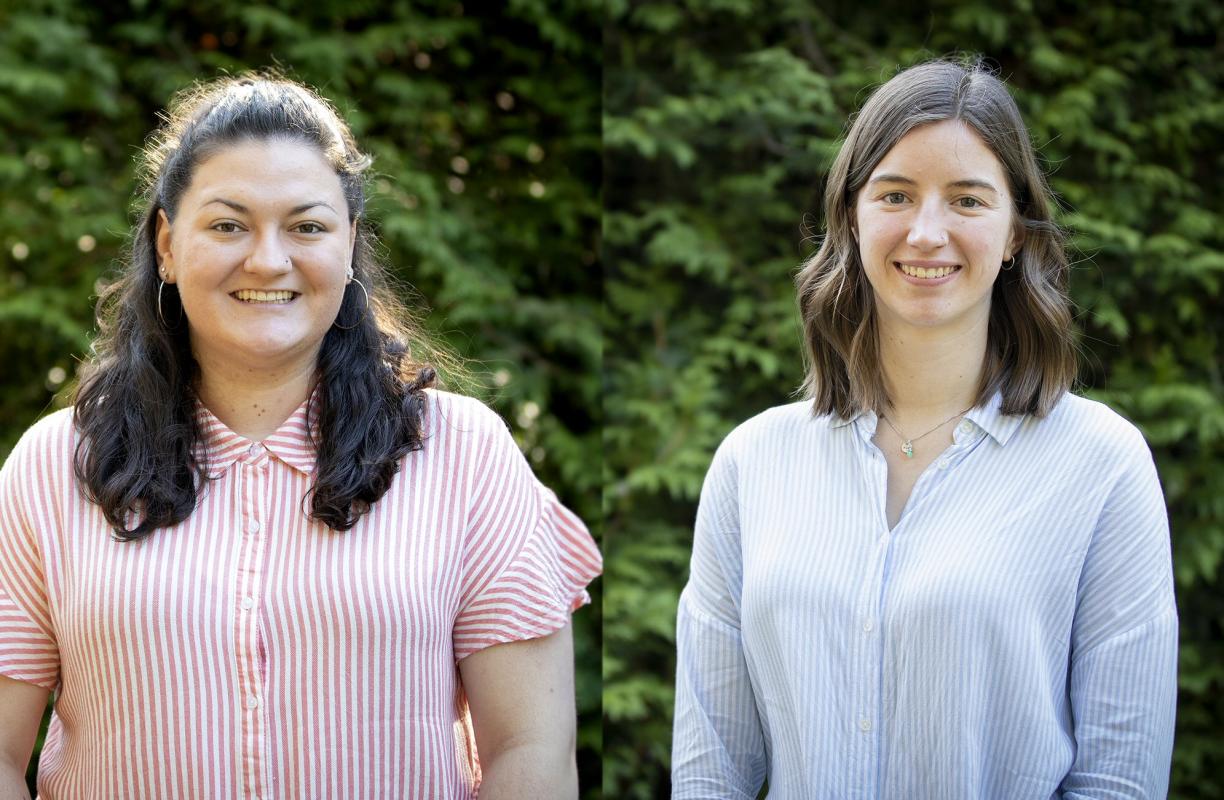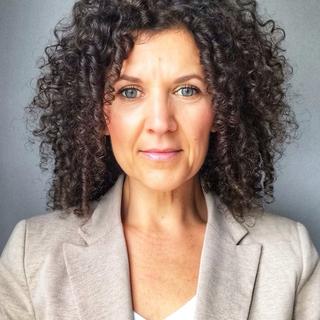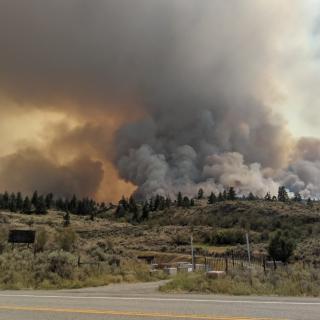Jocelyne Fournier, left, and Megan Fortune, VIU Tourism and Recreation students conducted research in Ghana, West Africa, to help communities build stronger environmental programming in their schools. Vancouver Island University Photo
Tourism and Recreation students receive research awards for their work strengthening environmental programming for junior high schools in Ghana, West Africa.
Vancouver Island University (VIU) Tourism and Recreation students are helping junior high schools in Ghana, West Africa strengthen their environmental programming so youth in the region can gain knowledge to help protect sensitive ecosystems and save endangered hippos.
VIU students Jocelyne Fournier and Megan Fortune worked with teachers and students living within the Wechiau Community Hippo Sanctuary, which stretches 40 kilometres along the Black Volta River and is home to one of the two remaining hippopotamus populations in Ghana. The sanctuary, a community-based initiative, is owned and managed by the Traditional Chiefs and people of the Wechiau Traditional Area. There are 17 communities that reside within the sanctuary.
Fournier interviewed teachers and headmasters from four schools, asking them about curriculum and what environmental values they teach. Fortune surveyed students and asked them what they knew about the sanctuary, whether or not they had seen a hippo before and their environmental knowledge about Ghana.
“Some junior high schools were very connected with the sanctuary and others had never had a representative from the sanctuary come to the school,” says Fournier. “There are a lot of students living in the sanctuary who have never seen a hippo in their lives.”
Fournier and Fortune are providing the Ghana community and sanctuary stakeholders with a technical report of their findings and have created research posters outlining their results.
The students conducted their research prior to the COVID-19 pandemic through the VIU Ghana Research and Study Tour, which is a month-long field school offered through VIU’s World Leisure Centre of Excellence. It focuses on sustainable tourism development in rural and remote communities in Ghana. Participants also get a chance to apply their learning, develop cross-cultural research skills and engage in impactful research.
Aggie Weighill, a VIU Recreation and Tourism Professor and leader of the study tour, says the field school helps change participants’ world views and gives them a global perspective.
“They are confronted with poverty in ways they have never seen,” says Weighill, adding that they also see a level of contentedness and happiness that often isn’t shown in mainstream media. “Students also gain a much greater world view where tourism development is concerned as well as a better understanding of what “post-colonial” means in countries where the colonizers left versus Canada where settlers remained and remain in the dominant positions in power.”
Fournier and Fortune both won VIU REACH Awards for their individual research projects.
“I was really excited and proud. It is a tangible result of our hard work,” says Fournier about receiving a REACH award, adding that the awards are important to encourage students to take on research projects. Sometimes it can be difficult because of financial barriers. “It’s definitely a relief to know I have the support. VIU has a really supportive research community and it gave me that push to keep going and complete the project.”
“It’s really important to bring our research back to the community and really share what we were able to find though our research,” says Fortune.
REACH Awards provide VIU undergraduate and graduate students with a $3,000 stipend to conduct their own original research under the mentorship of a faculty member.
“These awards are vital in promoting students to pursue research that is impactful,” says Weighill. “That Megan and Jocelyne both were able to receive these awards is an indication of the breadth, depth and importance of the research they are doing. The funds will also allow them to return to Ghana to present their research to our partners and other key stakeholders – something that others have not had the opportunity to do.”
Fournier and Fortune were also accepted to present a joint paper on their research at the 16th Canadian Conference on Leisure Research this May, but unfortunately the conference was cancelled because of COVID-19 physical distancing measures. The conference is held every three years and is attended by researchers from across the globe.
-30-
MEDIA CONTACT:
Rachel Stern, Communications Officer, Vancouver Island University
C: 250.618.0373 l E: Rachel.Stern@viu.ca | T: @VIUNews
VIU’s REACH Awards financially support undergraduate and graduate students to conduct their own original research under the mentorship of a faculty member. This year 15 awards of $3,000 were given out. Ten were awarded to undergraduates and five to graduate students. The following students are recipients of the 2019 awards:
- Austin Lawson, Abstracting Variability Within Categories with faculty mentor Dr. Jeffrey Nichol
- Jeremy Wright, An Examination of Student Study Behaviour and the Perceived Restorative Effects of Visual Access to Nature with faculty mentor Dr. Lindsay McCunn
- Jocelyne Fournier, Exploring Environmental Education Curriculum and Programming in Wechiau Junior High Schools with faculty mentor Dr. Aggie Weighill
- Jordyn Monaghan, Criminal Justice Students Assessment of Intimate Partner Violence with Intoxication with faculty mentor Dr. Joanne Falvai
- Katelyn Horsley, The Impact of Selective Serotonin Reuptake Inhibiters on Sleep Quality and Hypervigilance Within Mothers with faculty mentor Dr. Elliott Marchant
- Kelsey Compagna, Impact of Peer Mentorship Programs on Undergraduate Diploma Nursing Students and New Graduate Nurses with faculty mentor Mary Anne Moloney
- Madeline Clarke, Decreasing Transplant Shock of Arbutus Menziesii using Ellepot System Propagation Containers with faculty mentor Christine Quist
- Megan Fortune, Exploring Pro-Environmental Behaviors and Values of Junior High School Students in the Wechiau Community Hippo Sanctuary, Ghana with faculty mentor Dr. Aggie Weighill
- Samuelle Simard-Provençal, Hyperparasitism of Avian Ectoparasitic Hippoboscid Flies by Mites on Vancouver Island, BC, with faculty mentor Dr. Tim Goater
- Tish Lewis, Discrepancies Between Subjective and Objective Sleep Quality in Mothers with faculty mentor Dr. Elliott Marchant
- Chi Thi Le Nguyen, A Case Study of Mindfulness Practices for Students in Elementary School with faculty mentor Dr. Nancy Norman
- Danielle Carrie, Embedding Trauma-Informed Practice Within a School District with faculty member Dr. Mary Ann Richards
- Ericka Amador, Microtransit in Microcommunities: A Community Bus Feasibility Study for Quadra and Cortes Islands with faculty mentor Dr. Karin Albert
- Sherri Ko, Navigating the Staircase of Education and Life: What Teens/Young Adults with Developmental Coordination Disorder Have to Share with faculty mentor Dr. Amanda McKerracher
- Wenjue Jia, To Hinder or Enable: How Teacher Evaluation Systems Can Affect the Successful Implementation of Differentiated Learning with faculty mentor Dr. Bonita Davidson





